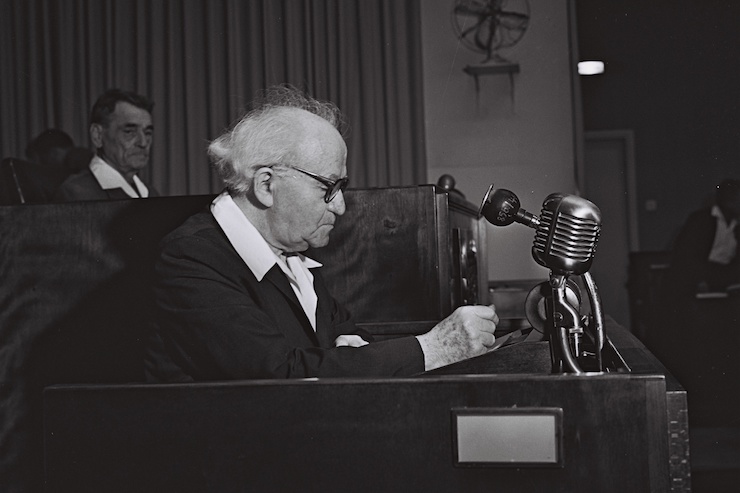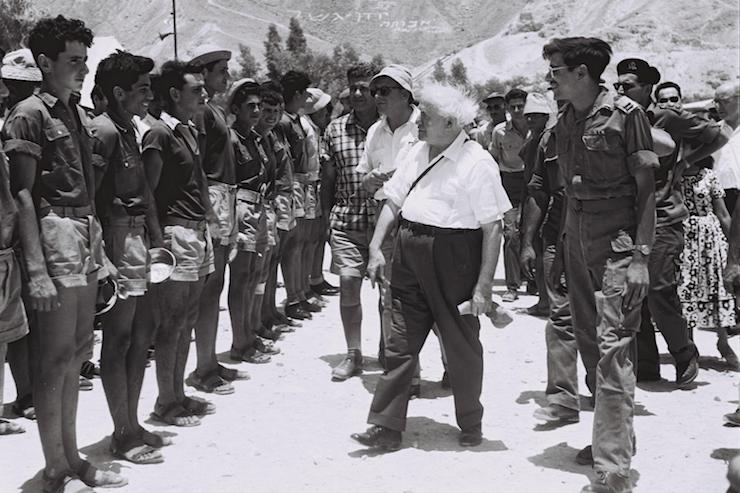In his recent book, Dr. Dmitry Shumsky shows that, contrary to popular belief, the forefathers of Zionism did not envision a state based on Jewish supremacy. And yet Zionism, he says, inevitably involves the oppression of Palestinians.
By Meron Rapoport

No one was surprised when the authors of the Jewish Nation-State Law decided to write, in its opening clauses, that “The State of Israel is the nation-state of the Jewish people,” and “the right to national self-determination in Israel is unique to the Jewish people.” After all, this is precisely what every young Israeli is taught in school, whether they are Jewish or Arab. Israel, so it goes, is the “nation-state” of the Jewish people, and establishing a Jewish state was the goal of the Zionist movement since its inception.
Even those opposed to the Jewish Nation-State Law did not disagree with this line of thinking. There were those who argued that the law needs to include the principle of equality, as mentioned in the Declaration of Independence, as that would be “the real Zionist” thing to do. There were others who claimed that the law only proves that Zionism was and remains a racist movement. But neither group questioned the idea that a Jewish nation-state lies at the core of Zionism. Those who suggested Israel become a state of all its citizens, or, God forbid, a bi-national state, were perceived as traitors undermining Israel and the Zionist project.
In his book, Beyond the Nation-State, published last year by Yale University Press, Dr. Dmitry Shumsky, a historian of the Zionist movement at the Hebrew University, attempts to prove that this perception is historically incorrect.
With extensive quotes by Zionism’s forefathers — Leon Pinsker, Ahad Ha’am, Theodore Herzl, Ze’ev Jabotinsy and David Ben-Gurion — he shows that over the course of Zionism’s first five decades, from the late 19th century until the early 20th century, the movement didn’t aim for establishing a “nation-state” the way it is commonly understood today, and as is reflected in the Jewish Nation-State Law. According to Shumsky, the Zionist leaders envisioned the Jewish state as a multi-national one, or even as an entity within a larger framework, similar to the federalist structure in the United States.
“The future of Palestine must be founded, legally speaking, as a ‘bi-national state,’” Shumsky quotes from a 1926 article by Jabotinsky, the ideological leader of Revisionist Zionism. “And not just Palestine. Every land that has an ethnic minority, of even the smallest kind, would need, after all, according to our deeply held views, to adapt its legal regime to that fact and become a bi-tri-national or quadri-national state.”
The Land of Israel, Ben-Gurion wrote in a 1930 article, “will be a federal state…in such a way that at no point in time will there be Arab rule over Jews or Jewish rule over Arabs.” A year later, the text of that article became the platform for Mapai, Ben Gurion’s party, which dominated Israeli politics from 1948 until 1977.
This multi-ethnic perspective, Shumsky shows, is rooted in the time and place from which Zionism’s founders operated. Until 1918, he says, most European Jews had lived in two multi-ethnic empires – either under the Russian Tzar or the Austro-Hungarian Empire. Palestine was ruled by the Ottoman Empire, which included significant Jewish populations as well. No less important than the Zionist idea, argues Shumsky, was the importance that Zionist leaders placed on ensuring Jewish existence in Europe. This, they believed, was only possible by turning this empires into multi-ethnic states.
And they believed it could happen. First in the Austro-Hungarian Empire, where socialist thinkers in Austria created the “multi-national state,” which deeply impacted Jabotinsky, Ben-Gurion and others. Both Jabotinsky and Ben-Gurion also wrote songs of praise to the Ottoman Empire, its tolerance toward ethnic minorities in general — and to Jews in particular — as well as to the democratic changes it was undergoing. As such, they viewed Jewish settlement in Palestine as a part of that empire. In Herzl’s utopian novel, Altneuland, he images Palestine as a member of that empire.

When those empires collapsed following the First World War, the problems Jews faced in the newly-established countries in Eastern and Central Europe did not disappear. In fact, they only got worse. The need for a multiethnic state, therefore, did not disappear either — not even after the British Mandate committed to establishing a national home for Jews in Palestine with the Balfour Declaration. Shumsky argues that a “package deal” was at play: national rights for Jews in Europe in return for national rights for Arabs in Palestine — after achieving a Jewish majority, of course.
In Altneuland, Herzl presents this equation very clearly. One of the protagonists in the book, which is structured as a journey into the future after the creation of a Jewish state, describes the positive changes in the status of Jews in Europe after some of them emigrated to Palestine. “The tolerance is based on mutual recognition,” says the protagonist, “and only once Jews here [in Palestine – M.R.], where they are a majority, have shown tolerance, are they themselves enjoying tolerance everywhere else,” meaning Europe.
The tragedy, says Shumsky, is that with the Holocaust and the systematic extermination of European Jewry, this “package deal” that the founders of Zionism believed in was emptied of all meaning, since there were no more Jews to protect. This is one of the central forces that pushed the Zionist movement toward the path it took in 1948, claims Shumsky.
That Shumsky weaves the Zionist story with that of Eastern European Jewry is perhaps connected to his biography. Born in 1975 in Kiev under Soviet rule, which was a multiethnic empire in its own way, Shumsky was a victim of “very, very intense” anti-Semitism, suffering both physical and verbal violence. His Jewish identity didn’t mean much, besides a strong sense of pride in Jewish revolutionaries and Einstein, he says, but his Jewish identity was “very existential. Being Jewish wasn’t a happy experience for me. On the other hand, since you’re already Jewish, then this is yours, this is your destiny.”
Shumsky arrived to Israel in 1990, not out of Zionist motivations (“We wanted to go to the United States,” like other Jews at the beginning of the 20th century, he says), but with an aversion to ideologies and brainwashing. As such, he grew uncomfortable with what he was being taught about Jewish history and Zionism at school. It seemed one-dimensional to him.
What is the most inaccurate thing that they teach us at schools here?
“In my field of study, they don’t teach the most basic things. They don’t teach Altneuland. It’s a scandal. If they were teaching even basic Zionist texts, then the prevailing image would be that nationalism is not what you thought. It is not something isolated and one-dimensional. It’s the opposite.”
Why is it important to know what Jabotinsky, Ahad Ha’am, Herzl or Ben-Gurion thought of a multinational state? After all, things didn’t develop in this direction.
“First, because in order to decide we have to know. But beyond that, you get to see the development, the dynamism, the complexity. The government is interested in imparting an idea of Zionist nationalism that is static, one-dimensional. Anything that points toward more than one path, more than one identity, is considered outside of nationalism. Once you look deeper, you understand that it is all nonsense. Is it good for the education of the next generation to know that Herzl thought the national language of the Jews needs to be German? Yes, it is. Not because we want to adopt German, but because we know that the idea of Jewish nationalism is pluralistic and open to surrounding developments.”
Of all the Zionist leaders in your book – Pinsker, Herzl, Ahad Ha’am, Jabotinsky and Ben-Gurion – who was the most multinational?
“Jabotinsky was the most multinational. Paradoxically, he was most in favor of a [Jewish] majority, a state, militarism – but that’s unrelated. What’s important is how you imagine nations. He couldn’t imagine a merger between ethnicity and state; it didn’t work in his mind. Just as he imagined Russia as a federation. The place he lived in made it easy for him to envision an ideal multiethnic nation. This is where his rejection of partition stems from. It’s not just about historic right, he suffered from national claustrophobia. To imagine the existence of different groups, he had to see a very, very large space.”
Was it a constraint or did he see something positive in it?
“He was opposed to the discourse of ‘brotherhood of nations.’ It isn’t even a friendship among nations — it’s a multi-story building with multiple apartments. You don’t even have to know your neighbor to live in a shared building. But it doesn’t mean that this is tactical, it wasn’t a constraint. It was an ideal – he even found aesthetic value in it, like an orchestra.”
Jabotinsky’s heirs
Jabotinksy may have written The Iron Wall, in which he claimed that peace with the Arabs will be possible only after they have been subdued militarily and accept the Jewish entity in Palestine, but Shumsky shows that even this worldview did not change Jabotinsky’s basic support for a multi-national state. In his last book, The Jewish War Front, published in 1940 shortly before his death, Jabotinsky proposes a multi-national constitution, which Shumsky says is reminiscent of Belgium. In Jabotinsky’s vision, the Jewish prime minister would have an Arab deputy and vice versa, while the Jewish and Arab communities would be autonomous who vote for a joint parliament.

At the same time, however, Jabotinsky writes that he would be willing to accept the possibility that, should they refuse this arrangement, the Arabs would emigrate from Palestine. “I do not see any necessity for this emigration and it would be undesirable in many respects, but if it turns out that the Arabs prefer to emigrate, it is permissible to discuss this possibility without a trace of regret.”
“It’s not that [emigration] isn’t there,” says Shomsky, “but he could have said: ‘If they are fighting us, then there is no need for a multi-national state.’
If these were his positions, how can Netanyahu view himself as Jabotinsky’s heir?
“Do you know how many people see themselves as Jabotinksy’s successors? All you need to do is hang a portrait of him. You simply ignore specific aspects like multi-nationalism or his writings on what constitutes a state, which Jabotinsky viewed as something functional rather than intrinsic.”
But if Jabotinsky’s image has been twisted over the years, Herzl’s image, says Shumsky, is entirely divorced from reality. “How can ‘Im Tirzu’ adopt Herzl?” he asks, referring to the far-right political group that uses the thinker’s image as their logo. “He was a universalist. His Jewish nationalism was clearly intended to serve his universalism. The Jewish people needed to be in a state, they needed to be in the homeland, but [only] in order to serve the universalist cause to be a light unto nations. To show the Europeans that it is possible to be liberal.
He was fundamentally opposed to Hebrew, since he saw it as an expression of provincialism. He thought that the European languages — ‘enlightened’ languages, Germany and France — are a national asset of the Jews, ‘the precious homeland of our thoughts,” as he wrote. Ahad Ha’am viewed this as obsequiousness. But not in Herzl’s eyes. He was the quintessential European Man. And this is the person Im Tirzu has adopted. It’s so pathetic.”

Most researchers pay little attention to the fact that Herzl’s vision for Jewish state, as outlined in Altneuland, is a province in the Ottoman Empire, treating it as the Zionist forefather’s attempt not to upset the Turks who ruled Palestine at the time. Shumsky thinks that there is something deeper at play here. After all, both Ben Gurion and Jabotinsky supported the “Turkish option” until the Balfour Declaration in 1917.
Ben Gurion and Jabotinsky truly saw an Ottoman federation as an option?
Yes, without a doubt. In 1914, Ben Gurion publishes an article about “The Question of the Orient,” in which he writes that it is not at all obvious that the Allies of World War I [France, Britain, and Russia – M.R.] would be good for Zionism. There is an incredible and accurate line there, that among Western countries, liberalism is a ‘usable currency in the internal market only.’ When they get to India, democracy meant nothing. Isn’t this authentic?”
Living under a Muslim empire wasn’t a problem for Ben Gurion and Jabotinsky?
No, on the contrary. They speak about the Ottoman Empire as an example of hundreds of years of tolerance. Ben Gurion wrote in the Ahdut newspaper in Palestine, Jabotinsky wrote in a newspaper in Odessa. They probably didn’t read each other, but they both write that the national autonomy proposed in Austria has existed in Turkey for hundreds of years.”
Shumsky says that for Ben Gurion it got to the point that he continued to believe in the Turkish option even after the Turks expelled him from Palestine for being a Russian subject. In 1916, while in New York, he wrote an article in a Jewish American newspaper named Hatoran in which he “explained” to American Jewry why Turkey is better for the Jews than the United States, since the latter is trying to make them assimilate.
A tragic turning point
And yet, Ben Gurion changed direction. Not only vis-à-vis his ideas on the Ottoman Empire, which eventually crumbled, but also regarding the meaning of a “Jewish state.” It happened, according to Shumsky, after the British-appointed Peel Commission — formed after the beginning of the “Arab Revolt” in 1936 — proposed partitioning the country into Jewish and Arab states, and would entail transferring nearly 225,000 Arabs from the would-be Jewish state and 1,250 Jews from the would-be Arab state.
“The idea of partition came from the colonialists,” says Shumsky. “The Zionist movement did talk about partition before, but not like this.” Shumsky shows how immediately after the Peel Commission published its recommendations, Ben Gurion gradually stops speaking about Arab national rights in the Land of Israel and begins speaking about individual rights. The big change, however, comes with the Holocaust.
“With Ben Gurion it’s very clear,” Shumsky says, “In the 1920s he still holds on to a worldview according to which we don’t want Jews to be oppressed and discriminated against in the diaspora, and thus we are striving to establish a state with collective rights. He had a kind of unwritten agreement with the goyim.”

Shumsky describes how a speech delivered in 1945 following the Holocaust, in which Ben Gurion says that the Arabs will have a place in the Jewish state, but as individuals, not as a political entity. “One must understand that the idea of a ‘nation,’ in the most basic sense, is code for political rights,” says Shumsky. “The moment you say that someone doesn’t have national rights, it’s an elegant, or perhaps not so elegant way of denying him political rights and clearly making him inferior.”
You’re saying that until that point Zionism did not want a nation-state?
“I am saying that Zionism wanted national self-determination, [but] throughout most of its years it did not seek it in the form of a nation-state, due to the interests of the Jewish people, here and in the diaspora. The nation-state paradigm was not good for Zionism for years.”
I’ll ask a question that one must not ask a historian. Could Zionism have developed in a different way?
“On the one hand, asking ‘what could have been’ is not a legitimate question. On the other hand, it is one of the most important questions to ask when conducting historical analysis. That Zionism could have developed differently is obvious; the question is how. I want to emphasize that I do not think things would have been fundamentally different regarding what happened to the Palestinian people. Palestinians didn’t care what kind of Jewish-majority state they would live in. They simply didn’t want a Jewish majority, and justifiably so.”
But the question is whether the only way was through expelling Palestinians. Through attempting to erase them.
“After a series of events it did become inevitable. The Zionist imagination also included that erasure. It was there. But it wasn’t the only option. Jabotinsky wanted a single multinational state that would be built as a consociational democracy. Could this have happened? Following the Holocaust, it was simply impossible. When Jabotinsky spoke about a large Jewish majority, he imagined millions of Polish Jews immigrating, those same Jews who were later murdered. At the time he could imagine all this without expulsions.”

Isn’t this a kind of apologetics for Zionism?
“I don’t think so. On the other hand, there are both right wingers as well as the Labor Party who say: you are undermining the right of the Jewish people to a state because what you are actually saying is that Zionism did not want a nation-state.”
Is there anything we can weave into our current political thought in Israel?
“Full civil rights must consider the identity and national affinities of the individual. I can only think in bi-national or multi-national terms. And in this there is no contradiction with Zionism. On the contrary.”
This article was first published in Hebrew on Local Call. Read it here.
